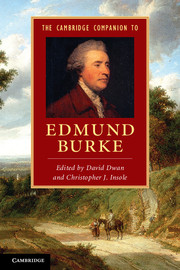Book contents
- Frontmatter
- Contents
- Contributors
- Acknowledgements
- Method of Citation
- Chronology
- Introduction Philosophy in Action
- 1 Burke’s Life
- 2 Burke, Enlightenment and Romanticism
- 3 Burke as Rhetorician and Orator
- 4 Burke’s Aesthetic Psychology
- 5 Burke on Law and Legal Theory
- 6 Burke on Political Economy
- 7 Burke and Religion
- 8 Burke and the Constitution
- 9 Burke and the Natural Law
- 10 Burke and Utility
- 11 Burke and the Ends of Empire
- 12 Burke and the American Crisis
- 13 Burke on India
- 14 Burke and Ireland
- 15 Reflections on the Revolution in France
- 16 Burke’s Counter-Revolutionary Writings
- 17 Burke in the United States
- Further Reading
- Index
- References
1 - Burke’s Life
Published online by Cambridge University Press: 05 December 2012
- Frontmatter
- Contents
- Contributors
- Acknowledgements
- Method of Citation
- Chronology
- Introduction Philosophy in Action
- 1 Burke’s Life
- 2 Burke, Enlightenment and Romanticism
- 3 Burke as Rhetorician and Orator
- 4 Burke’s Aesthetic Psychology
- 5 Burke on Law and Legal Theory
- 6 Burke on Political Economy
- 7 Burke and Religion
- 8 Burke and the Constitution
- 9 Burke and the Natural Law
- 10 Burke and Utility
- 11 Burke and the Ends of Empire
- 12 Burke and the American Crisis
- 13 Burke on India
- 14 Burke and Ireland
- 15 Reflections on the Revolution in France
- 16 Burke’s Counter-Revolutionary Writings
- 17 Burke in the United States
- Further Reading
- Index
- References
Summary
More than with most figures in the Western intellectual tradition, understanding Burke’s contributions requires some knowledge of his biography. This is especially important for his political ideas, for he wrote no sustained and systematic work of political theory. His views have to be derived from a long and varied series of writings and speeches, all of which were responses to particular occasions and problems. Without knowing these contexts, readers are liable to misconstrue his arguments. A succinct narrative of Burke’s career thus provides an essential background for detailed thematic studies, for his life both generated and constrained the production of the writings and speeches that are his legacy to the world.
Early years: 1730–1765
Born in Dublin in 1730, Burke lived in Ireland until 1750, when he left to study law in London. The importance of his Irishness is universally acknowledged, though scholars disagree about the precise nature of its influence. His father was a Protestant and an attorney, possibly, but probably not a convert from Roman Catholicism. Nothing is known of his father’s background. His mother came from a well-documented family of Catholic gentry, who had lost much, though not all, of their property. Burke was one of four children who survived infancy. As a child, he suffered poor health, and was sent to stay with relatives in the Blackwater valley in County Cork, perhaps for as long as five years (1735–40). In 1741, he was sent to a boarding school at Ballitore, County Kildare, kept by Abraham Shackleton, a Quaker who had emigrated from Yorkshire. Burke retained fond memories of Ballitore and his master. In 1744, he entered Trinity College, Dublin, then a bastion of the Protestant establishment, and still primarily a training college for the Church of Ireland. There he followed the regular four-year arts course, graduating in February 1748. His academic record was undistinguished. Shortly after graduating, he helped to write and edit the Reformer, a short-lived periodical on the plan of the Spectator. The remainder of his time in Dublin is a blank. From this bare outline, one conclusion can confidently be drawn: Burke’s Irishness was a complex inheritance.
- Type
- Chapter
- Information
- The Cambridge Companion to Edmund Burke , pp. 15 - 26Publisher: Cambridge University PressPrint publication year: 2012
References
- 1
- Cited by

